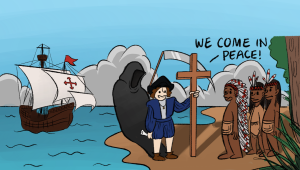Columbus Day oversimplifies history
October 20, 2019
“They would make fine servants … With fifty men we could subjugate them all and make them do whatever we want.” As he first encountered the Taíno people of Guanahani (San Salvador) on Oct. 12, 1492, Christopher Columbus wrote his first impressions in his journal — that they were fit for servitude.
That was only the beginning. Columbus and his crew proceeded to pillage, rape and enslave the native people, many of whom chose to commit suicide. Then came the wanton murders. When Columbus first arrived, historians estimate that there were about 300,000 Indians living on the island of Hispaniola. By 1550, there were only five hundred left.
Yet how is Columbus best remembered in the public eye? Columbus Day is a holiday designed to instill a sense of fascination for the explorer and celebrate the connection between the “old” and “new” worlds. All most Americans remember is that “In 1492, Columbus sailed the ocean blue” — neglecting the painful history of many Native Americans by overly simplifying their story. In the context of our 21st-century world, celebrating Columbus Day stands out like a sore thumb amidst our collective attempts to foster diversity and respect in our roles as global citizens.
Although many argue that Columbus’s importance in world history justifies holding a day for him, designating a holiday for a person carries a significance of commendation that goes beyond solely remembrance. Other major observances — Martin Luther King Jr. Day and Veterans Day — all celebrate those who sacrificed to uphold ideals of liberty. Should someone who persecuted an entire population be placed on the same pedestal as a MLK, a man who led his people out of brutal oppression?
To be sure, Columbus and his voyages remain an integral part of world and U.S. history, and they can not and should not be forgotten. Not observing Columbus Day does not imply that this history will be neglected. Rather, it would affirm our commitment to remembering both a tale of discovery but also its repercussions on the victims when we reflect on the lasting effects of Christopher Columbus.


















![“[Building nerf blasters] became this outlet of creativity for me that hasn't been matched by anything else. The process [of] making a build complete to your desire is such a painstakingly difficult process, but I've had to learn from [the skills needed from] soldering to proper painting. There's so many different options for everything, if you think about it, it exists. The best part is [that] if it doesn't exist, you can build it yourself," Ishaan Parate said.](https://harkeraquila.com/wp-content/uploads/2022/08/DSC_8149-900x604.jpg)




![“When I came into high school, I was ready to be a follower. But DECA was a game changer for me. It helped me overcome my fear of public speaking, and it's played such a major role in who I've become today. To be able to successfully lead a chapter of 150 students, an officer team and be one of the upperclassmen I once really admired is something I'm [really] proud of,” Anvitha Tummala ('21) said.](https://harkeraquila.com/wp-content/uploads/2021/07/Screen-Shot-2021-07-25-at-9.50.05-AM-900x594.png)







![“I think getting up in the morning and having a sense of purpose [is exciting]. I think without a certain amount of drive, life is kind of obsolete and mundane, and I think having that every single day is what makes each day unique and kind of makes life exciting,” Neymika Jain (12) said.](https://harkeraquila.com/wp-content/uploads/2017/06/Screen-Shot-2017-06-03-at-4.54.16-PM.png)








![“My slogan is ‘slow feet, don’t eat, and I’m hungry.’ You need to run fast to get where you are–you aren't going to get those championships if you aren't fast,” Angel Cervantes (12) said. “I want to do well in school on my tests and in track and win championships for my team. I live by that, [and] I can do that anywhere: in the classroom or on the field.”](https://harkeraquila.com/wp-content/uploads/2018/06/DSC5146-900x601.jpg)
![“[Volleyball has] taught me how to fall correctly, and another thing it taught is that you don’t have to be the best at something to be good at it. If you just hit the ball in a smart way, then it still scores points and you’re good at it. You could be a background player and still make a much bigger impact on the team than you would think,” Anya Gert (’20) said.](https://harkeraquila.com/wp-content/uploads/2020/06/AnnaGert_JinTuan_HoHPhotoEdited-600x900.jpeg)

![“I'm not nearly there yet, but [my confidence has] definitely been getting better since I was pretty shy and timid coming into Harker my freshman year. I know that there's a lot of people that are really confident in what they do, and I really admire them. Everyone's so driven and that has really pushed me to kind of try to find my own place in high school and be more confident,” Alyssa Huang (’20) said.](https://harkeraquila.com/wp-content/uploads/2020/06/AlyssaHuang_EmilyChen_HoHPhoto-900x749.jpeg)











Masuku-San • Oct 20, 2021 at 8:54 am
Colombus was a really GREAT guy, huh middle school?
Mf • Oct 12, 2020 at 3:54 pm
My daughter and I think columbus day should be renamed empathy day.